新概念第四册课文翻译及学习笔记:Lesson22.doc
新概念四Lesson 22 Knowledge and Progress
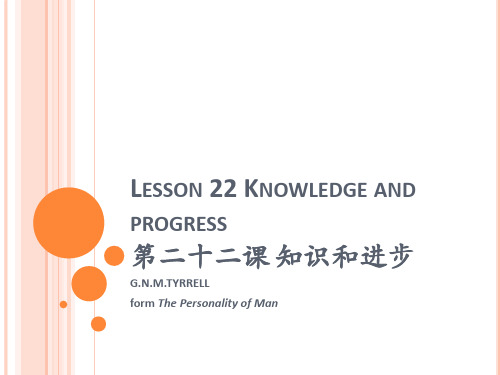
Surely progress of a particular kind 某一种 is actually taking place around us and is becoming more and more manifest.
【单词和短语】 Surely
because 无疑是因为 manifest:显然的,明白无误的,明了的 (plain and easy to see),例如: manifest superiority 明显的优势 It was manifest to all of us that he would fail. 他要失败,这点对我们大家来说是显而易见 的。
②If a worrying or threatening situation or event is looming, it seems likely to happen soon. 例句:The looming threat of recession made them anxious.
22-2.
22-3. Although mankind has undergone no general improvement in intelligence or morality, it has made extraordinary progress in the accumulation of knowledge.
22-6. Libraries made education possible, and education in its turn added to libraries: the growth of knowledge followed a kind of compound interest law, which was greatly enhanced by the invention of printing.
新概念英语第四册Lesson+22+Knowledge+and+progress+课件

• man --- he • mankind / the human race --- it • Man has his problems. • Mankind / The human race has its problems.
④ Knowledge began to increase as soon as the thoughts of one individual could be communicated to another by means of speech.
smaller molecules.
• in (its) turn 反过来;转而又.... • Poverty led to social unrest, which in (its) turn aggravated
poverty. • Theory is based on practice and in (its) turn serves practice.
• un. / cn.s of a kind • progress of a particular kind • machines of a new kind
• a sort of
• be becoming more and more / increasingly + adj.. • So great is our passion for doing things for ourselves, that we are
by means of speech 通过语言的方式
⑤ With the invention of writing, a great advance was made, for knowledge could then be not only communicated but also stored.
新概念英语第四册笔记-完整版
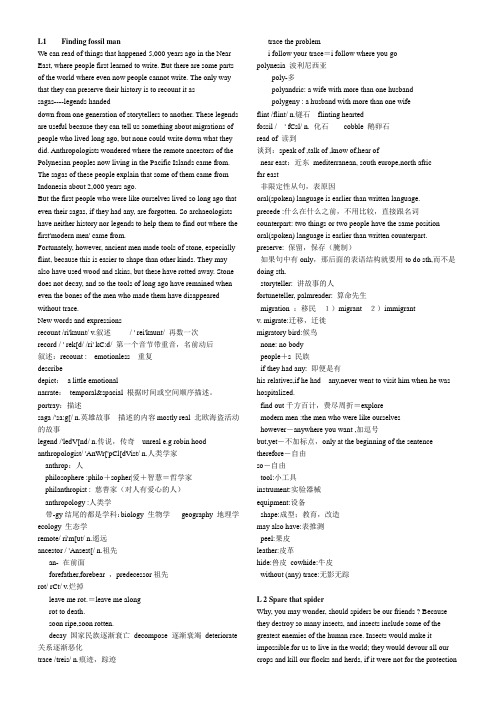
L1 Finding fossil manWe can read of things that happened 5,000 years ago in the Near East, where people first learned to write. But there are some parts of the world where even now people cannot write. The only way that they can preserve their history is to recount it assagas----legends handeddown from one generation of storytellers to another. These legends are useful because they can tell us something about migrations of people who lived long ago, but none could write down what they did. Anthropologists wondered where the remote ancestors of the Polynesian peoples now living in the Pacific Islands came from. The sagas of these people explain that some of them came from Indonesia about 2,000 years ago.But the first people who were like ourselves lived so long ago that even their sagas, if they had any, are forgotten. So archaeologists have neither history nor legends to help them to find out where the first'modern men' came from.Fortunately, however, ancient men made tools of stone, especially flint, because this is easier to shape than other kinds. They may also have used wood and skins, but these have rotted away. Stone does not decay, and so the tools of long ago have remained when even the bones of the men who made them have disappeared without trace.New words and expressionsrecount /ri'kaunt/ v.叙述/ ' rei'kaunt/ 再数一次record / ' rek[d/ /ri' kC:d/ 第一个音节带重音,名前动后叙述:recount : emotionless 重复describedepict:a little emotionalnarrate:temporal&spacial 根据时间或空间顺序描述。
新概念英语第四册第二十二单元课文原文

新概念英语第四册第二十二单元课文原文Lesson 22 Knowledge and progress 知识和进步Why does the idea of progress loom so large in the modern world? Surely because progress of a particular kind is actually taking place around us and is becoming more and more manifest. Although mankind has undergone no general improvement in intelligence or morality, it has made extraordinary progress in the accumulation of knowledge. Knowledge began to increase as soon as the thoughts of one individual could be communicated to another by means of speech. With the invention of writing, a great advance was made, for knowledge could then be not only communicated but also stored. Libraries made education possible, and education in its turn added to libraries: the growth of knowledge followed a kind of compound-interest law, which was greatly enhanced by the invention of printing. All this was comparatively slow until, with the coming science, the tempo was suddenly raised. Then knowledge began to be accumulated according to a systematic plan. The trickle became a stream; the stream has now become a torrent. Moreover, as soon as new knowledge is acquired, it is now turned to practical account. What is called 'modern civilization' is not the result of a balanced development of all man's nature, but of accumulated knowledge applied to practical life. The problem now facing humanity is: What is going to be done with all this knowledge? As is so often pointed out, knowledge is a two-edged weapon which can be used equally for good or evil. It is now being used indifferently for both. Could any spectacle, for instance, be more grimly whimsical than that of gunners using science to shatter men's bodies while, close at hand, surgeons use it to restore them? We have to ask ourselves very seriously what will happen if this twofold use of knowledge, with its ever-increasing power, continues. (NCE Book Four)1。
新概念第四册课文翻译及学习笔记:Lesson22

新概念第四册课文翻译及学习笔记:Lesson22【课文】First listen and then answer the following question.听录音,然后回答以下问题。
In what two areas have people made no 'progress' at all?Why does the idea of progress loom so large in the modern world? Surely because progress of a particular kind is actually taking place around us and is becoming more and more manifest. Although mankind has undergone no general improvement in intelligence or morality, it has made extraordinary progress in the accumulation of knowledge. Knowledge began to increase as soon as the thoughts of one individual could be communicated to another by means of speech. With the invention of writing, a great advance was made, for knowledge could then be not only communicated but also stored. Libraries made education possible, and education in its turn added to libraries: the growth of knowledge followed a kind of compound interest law, which was greatly enhanced by the invention of printing. All this was comparatively slow until, with the coming of science, the tempo was suddenly raised. Then knowledge began to be accumulated according to a systematic plan. The trickle became a stream; the stream has now become a torrent. Moreover, as soon as new knowledge is acquired, it is now turned to practical account. What is called 'moderncivilization' is not the result of a balanced development of allman's nature, but of accumulated knowledge applied to practical life. The problem now facing humanity is: What is going to be done with all this knowledge? As is so often pointed out, knowledge is a two-edged weapon which can be used equally for good or evil. It is now being used indifferently for both. Could any spectacle, for instance, be more grimly whimsical than that of gunners using science to shatter men's bodies while, close at hand, surgeons use it to restore them? We have to ask ourselves very seriously what will happen if this twofold use of knowledge, with its ever-increasing power, continues.G.N.M.TYRRELL The Personality of Man【New words and expressions 生词和短语】loom v. 赫然耸起manifest adj.明显的morality n. 道德communicate v. 交流,交际compound adj. 复合的enhance v. 增进tempo n. 速率trickle n. 涓涓细流torrent n. 滔滔洪流humanity n. 人类indifferently adv. 不在乎地grimly adv. 可怖地whimsical adj. 怪诞的shatter v. 毁坏twofold adj. 双重的【课文注释】1.loom,隐现(常令人生畏);即将发生。
新概念英语四册课堂笔记Lesson 22:Window in the Sea

新概念英语四册课堂笔记Lesson 22:Window inthe SeaLesson 22 Window in the Sea 海洋之窗There has long been a superstition among mariners that porpoises will save drowning men by pushing them to the surface, or protect them from sharks by surrounding them in defensive formation. Marine Studio biologists have pointedout that, however intelligent they may be, it is probably a mistake to credit dolphins with any motive of life-saving. On the occasions when they have pushed to shore an unconscious human being they have much more likely done it out ofcuriosity or for sport,as in riding the bow waves of a ship.In 1928 some porpoises were photographed working like beavers to push ashore a waterlogged mattress. If, as has been reported, they have protected humans from sharks, it may have been because curiosity attracted them and because the scentof a possible meal attracted the sharks. Porpoises and sharks are natural enemies.It is possible that upon such an occasion a battle ensued, with the sharks being driven away or killed. Whether it be bird, fish or beast, the porpoise is intrigued with anything that is alive. They are constantly after the turtles, the Ferdinands of marine life, who peacefully submit to all sorts of indignities. One young calf especially enjoyed raising a turtle to the surface with his snout and then shoving him across the tank like an aquaplane. Almost any day a young porpoise may be seen trying to turn a 300-pound sea turtleover by sticking his snout under the edge of his shell andpushing up for dear life. This is not easy, and may require two porpoises working together. In another game, as theturtle swims across the oceanarium, the first porpoise swoops down from above and butts his shell with his belly. This knocks the turtle down several feet. He no sooner recovers his equilibriu mthan the next porpoise comes along and hits him another crack. Eventually the turtle has been butted all the way down to the floor of the tank. He is now satis-fied merely to try to stand up, but as soon as he does so a porpoise knocks him flat. The turtle at last gives up by pulling his feet under his shell and the game is over.New words and expressions 生词短语porpoise n. 海豚总称词(general) : dolphin n. 海豚科动物/ human --> man womanshark n. 鲨鱼 / he is a shark 他是个大骗子Marine Studio 海洋摄影室 marine 海洋 submarine 潜水艇 marine product 海产品fresh marine product 海鲜 mariner/sailor/seaman 水手studio:工作室unconscious a. 不省人事 conscientious 有良知的narcose 昏迷的insensiblebeaver n. 海ashore ad. 上岸 / 只要具有 a+动词/形容词,都是表语词asleep, awake, acrawl, afloat, adrift都具有表语特点,只能说 he is 不能用定语结构,不能说asleep man.scent n. 香味 scent 身体发出味道 fragrance—flower, tree, grass,香山 fragrant hills. / aroma强烈的味道 / perfume :香水(aroma)ensue vt. 接着发生 ensue year:来年(following year)preceding year :前一年intrigue vt. 引起兴趣正式新闻体 journalism 常用 / 普通arrest, capture, seize, grab,attentionThe event is intriguing (interesting)turtle n. 海龟 turtle-neck :高领毛衣indignity n.侮辱 dignity 尊严 / It is beneath his dignity for a gentleman to lie.stand on one’s dignity 保持尊严/He stood on his dignity by rejecting the money his gived him.It is an indignity to say sorry in public.lose face , humiliation , insult 侮辱shove vt. 硬推 There was much shoving on getting on the bus. / He shoved me to the ground.aquaplane n. 驾浪滑水板 aqua 水+plane 木板stick vt. 把------插入 I got the wrong end of the stick.我听不懂。
新概念英语第四册课文及翻译
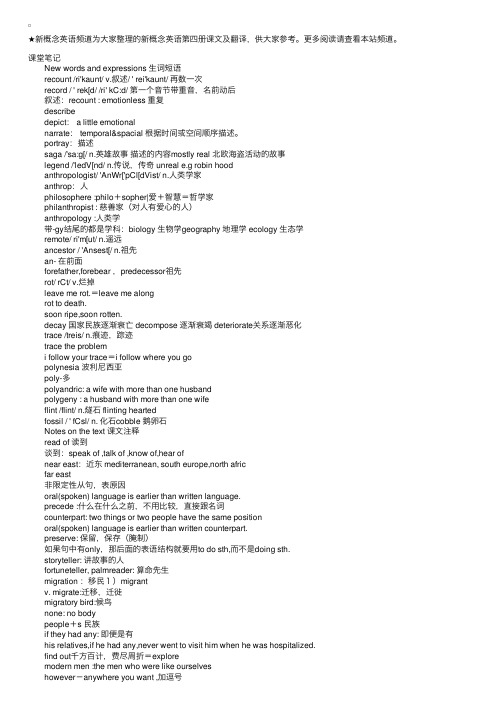
★新概念英语频道为⼤家整理的新概念英语第四册课⽂及翻译,供⼤家参考。
更多阅读请查看本站频道。
课堂笔记 New words and expressions ⽣词短语 recount /ri'kaunt/ v.叙述/ ' rei'kaunt/ 再数⼀次 record / ' rek[d/ /ri' kC:d/ 第⼀个⾳节带重⾳,名前动后 叙述:recount : emotionless 重复 describe depict: a little emotional narrate: temporal&spacial 根据时间或空间顺序描述。
portray:描述 saga /'sa:g[/ n.英雄故事描述的内容mostly real 北欧海盗活动的故事 legend /'ledV[nd/ n.传说,传奇 unreal e.g robin hood anthropologist/ 'AnWr['pCl[dVist/ n.⼈类学家 anthrop:⼈ philosophere :philo+sopher|爱+智慧=哲学家 philanthropist : 慈善家(对⼈有爱⼼的⼈) anthropology :⼈类学 带-gy结尾的都是学科:biology ⽣物学geography 地理学 ecology ⽣态学 remote/ ri'm[ut/ n.遥远 ancestor / 'Ansest[/ n.祖先 an- 在前⾯ forefather,forebear ,predecessor祖先 rot/ rCt/ v.烂掉 leave me rot.=leave me along rot to death. soon ripe,soon rotten. decay 国家民族逐渐衰亡 decompose 逐渐衰竭 deteriorate关系逐渐恶化 trace /treis/ n.痕迹,踪迹 trace the problem i follow your trace=i follow where you go polynesia 波利尼西亚 poly-多 polyandric: a wife with more than one husband polygeny : a husband with more than one wife flint /flint/ n.燧⽯ flinting hearted fossil / ' fCsl/ n. 化⽯cobble 鹅卵⽯ Notes on the text 课⽂注释 read of 读到 谈到:speak of ,talk of ,know of,hear of near east:近东 mediterranean, south europe,north afric far east ⾮限定性从句,表原因 oral(spoken) language is earlier than written language. precede :什么在什么之前,不⽤⽐较,直接跟名词 counterpart: two things or two people have the same position oral(spoken) language is earlier than written counterpart. preserve: 保留,保存(腌制) 如果句中有only,那后⾯的表语结构就要⽤to do sth,⽽不是doing sth. storyteller: 讲故事的⼈ fortuneteller, palmreader: 算命先⽣ migration :移民1)migrant v. migrate:迁移,迁徙 migratory bird:候鸟 none: no body people+s 民族 if they had any: 即便是有 his relatives,if he had any,never went to visit him when he was hospitalized. find out千⽅百计,费尽周折=explore modern men :the men who were like ourselves however-anywhere you want ,加逗号 but,yet-不加标点,only at the beginning of the sentence therefore-⾃由 so-⾃由 tool:⼩⼯具 instrument:实验器械 equipment:设备 shape:成型;教育,改造 may also have:表推测 peel:果⽪ leather:⽪⾰ hide:兽⽪ cowhide:⽜⽪ without (any) trace:⽆影⽆踪。
【新概念英语美音版第四册】全册课文及翻译
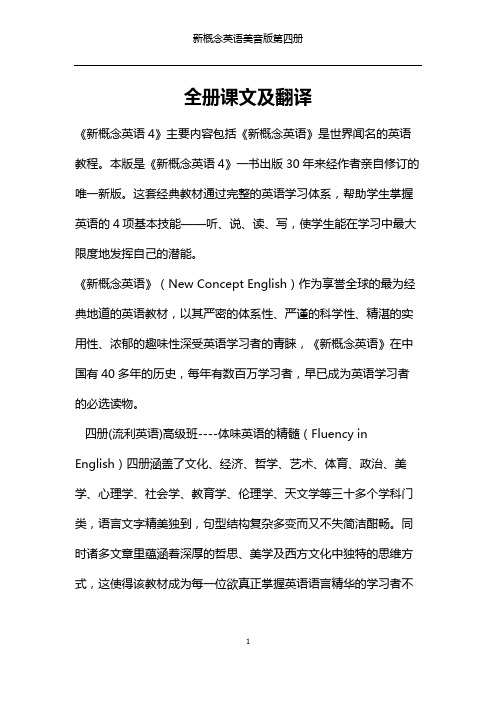
全册课文及翻译《新概念英语4》主要内容包括《新概念英语》是世界闻名的英语教程。
本版是《新概念英语4》一书出版30年来经作者亲自修订的唯一新版。
这套经典教材通过完整的英语学习体系,帮助学生掌握英语的4项基本技能——听、说、读、写,使学生能在学习中最大限度地发挥自己的潜能。
《新概念英语》(New Concept English)作为享誉全球的最为经典地道的英语教材,以其严密的体系性、严谨的科学性、精湛的实用性、浓郁的趣味性深受英语学习者的青睐,《新概念英语》在中国有40多年的历史,每年有数百万学习者,早已成为英语学习者的必选读物。
四册(流利英语)高级班----体味英语的精髓(Fluency in English)四册涵盖了文化、经济、哲学、艺术、体育、政治、美学、心理学、社会学、教育学、伦理学、天文学等三十多个学科门类,语言文字精美独到,句型结构复杂多变而又不失简洁酣畅。
同时诸多文章里蕴涵着深厚的哲思、美学及西方文化中独特的思维方式,这使得该教材成为每一位欲真正掌握英语语言精华的学习者不可多得、不可不学的教材。
教师将与你共同体味其中的奥妙。
完全掌握后,为雅思级别。
Lesson 1 Finding fossil man 发现化石人First listen and then answer the following question.听录音,然后回答以下问题。
Why are legends handed down by storytellers useful?We can read of things that happened 5,000 years ago in the Near East, where people first learned to write. But there are some parts of the world where even now people cannot write. The only way that they can preserve their history is to recount it as sagas2-- legends handed down from one generation of storytellers to another. These legends are useful because they can tell us something about migrations4of people who lived long ago, but none could write down what they did. Anthropologists wondered where the remote ancestors of the Polynesian peoples now living in the Pacific Islands came from. The sagas of these people explain that some of them came from Indonesia about 2,000 years ago.But the first people who were like ourselves lived so long ago that even their sagas, if they had any, are forgotten. So archaeologists have neither history nor legends to help them to find out where the first 'modern men' came from.Fortunately, however, ancient men made tools of stone, especially flint, because this is easier to shape than other kinds. They may also have used wood and skins, but these have rotted away. Stone does not decay, and so the tools of long ago have remained when even the bones of the men who made them have disappeared without trace.ROBIN6PLACE Finding fossil man我们从书籍中可读到5,000 年前近东发生的事情,那里的人最早学会了写字。
新概念英语第四册原文翻译详细笔记
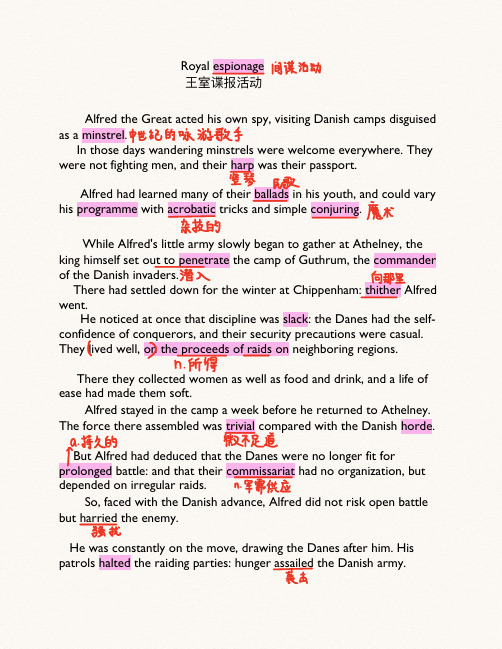
Royal espionage 王室谍报活动 Alfred the Great acted his own spy, visiting Danish camps disguised as a minstrel. In those days wandering minstrels were welcome everywhere. They were not fighting men, and their harp was their passport. Alfred had learned many of their ballads in his youth, and could vary his programme with acrobatic tricks and simple conjuring. While Alfred's little army slowly began to gather at Athelney, the king himself set out to penetrate the camp of Guthrum, the commander of the Danish invaders. There had settled down for the winter at Chippenham: thither Alfred went.He noticed at once that discipline was slack: the Danes had the self-confidence of conquerors, and their security precautions were casual. They lived well, on the proceeds of raids on neighboring regions.There they collected women as well as food and drink, and a life of ease had made them soft. Alfred stayed in the camp a week before he returned to Athelney. The force there assembled was trivial compared with the Danish horde. But Alfred had deduced that the Danes were no longer fit forprolonged battle: and that their commissariat had no organization, but depended on irregular raids. So, faced with the Danish advance, Alfred did not risk open battle but harried the enemy.He was constantly on the move, drawing the Danes after him. His patrols halted the raiding parties: hunger assailed the Danish army. ⼀一间谍活动中世纪的咏游歌⼿手⾦金金琴⺠民歌___魔术杂技的⾯面⼊入向那⾥里里-n 得-i 持久的微不不⾜足道需供⽽而应⾯面对尤击⼀一n⼩小规模战⽃斗Now Alfred began a long series of skirmishes -- and within a month the Danes had surrendered. The episode could reasonably serve as a unique epic of royal espionage! 阿尔弗雷雷德⼤大帝曾亲⾃自充当间谍。
新概念英语第四册Lesson20~22课文及翻译
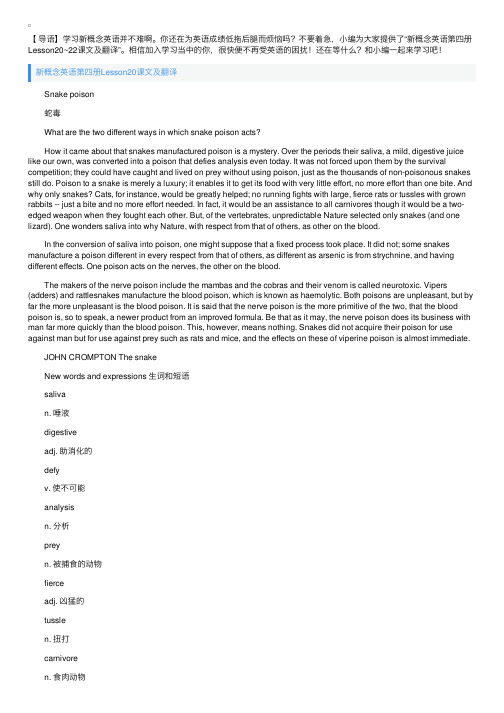
【导语】学习新概念英语并不难啊。
你还在为英语成绩低拖后腿⽽烦恼吗?不要着急,⼩编为⼤家提供了“新概念英语第四册Lesson20~22课⽂及翻译”。
相信加⼊学习当中的你,很快便不再受英语的困扰!还在等什么?和⼩编⼀起来学习吧!新概念英语第四册Lesson20课⽂及翻译 Snake poison 蛇毒 What are the two different ways in which snake poison acts? How it came about that snakes manufactured poison is a mystery. Over the periods their saliva, a mild, digestive juice like our own, was converted into a poison that defies analysis even today. It was not forced upon them by the survival competition; they could have caught and lived on prey without using poison, just as the thousands of non-poisonous snakes still do. Poison to a snake is merely a luxury; it enables it to get its food with very little effort, no more effort than one bite. And why only snakes? Cats, for instance, would be greatly helped; no running fights with large, fierce rats or tussles with grown rabbits -- just a bite and no more effort needed. In fact, it would be an assistance to all carnivores though it would be a two-edged weapon when they fought each other. But, of the vertebrates, unpredictable Nature selected only snakes (and one lizard). One wonders saliva into why Nature, with respect from that of others, as other on the blood. In the conversion of saliva into poison, one might suppose that a fixed process took place. It did not; some snakes manufacture a poison different in every respect from that of others, as different as arsenic is from strychnine, and having different effects. One poison acts on the nerves, the other on the blood. The makers of the nerve poison include the mambas and the cobras and their venom is called neurotoxic. Vipers (adders) and rattlesnakes manufacture the blood poison, which is known as haemolytic. Both poisons are unpleasant, but by far the more unpleasant is the blood poison. It is said that the nerve poison is the more primitive of the two, that the blood poison is, so to speak, a newer product from an improved formula. Be that as it may, the nerve poison does its business with man far more quickly than the blood poison. This, however, means nothing. Snakes did not acquire their poison for use against man but for use against prey such as rats and mice, and the effects on these of viperine poison is almost immediate. JOHN CROMPTON The snake New words and expressions ⽣词和短语 saliva n. 唾液 digestive adj. 助消化的 defy v. 使不可能 analysis n. 分析 prey n. 被捕⾷的动物 fierce adj. 凶猛的 tussle n. 扭打 carnivore n. ⾷⾁动物 vertebrate n. 脊椎动物 lizard n. 蜥蜴 concoct v. 调制 potency n. 效⼒ conversion n. 转变 arsenic n. 砒霜 strychnine n. 马钱⼦碱 mamba n. 树眼镜蛇 cobra n. 眼镜蛇 venom n. 毒液 neurotoxic adj. 毒害神经的 viper n. 蝰蛇 adder n. 蝮蛇 rattlesnake n. 响尾蛇 haemolytic adj. 溶⾎性的 viperine adj. 毒蛇 参考译⽂ 蛇是怎样产⽣毒液的,这是⼀个谜。
新概念英语第四册第22课-Knowledge and progress

新概念英语第四册第22课:Knowledge and progressLesson 22 Knowledge and progress知识和进步 First listen and then answer the following question.听录音,然后回答以下问题。
In what two areas have people made no 'progress' at all?Why does the idea of progress loom so large in the modern world? Surely progress of a particular kind is actually taking place around us and is becoming more and more manifest. Although mankind has undergone no general improvement in intelligence or morality, it has made extraordinary progress in the accumulation of knowledge. Knowledge began to increase as soon as the thoughts of one individual could be communicated to another by means of speech. With the invention of writing, a great advance was made, for knowledge could then be not only communicated but also stored. Libraries made education possible, and education in its turn added to libraries: the growth of knowledge followed a kind of compound interest law, which was greatly enhanced by the invention of printing. All this was comparatively slow until, with the coming of science, the tempo was suddenly raised. Then knowledge began to be accumulated according to a systematic plan. The trickle became a stream; the stream has now become a torrent. Moreover, as soon as new knowledge is acquired, it is now turned to practical account. What is called 'modern civilization' is not the result of a balanced development of all man's nature. but of accumulated knowledge applied to practical life. The problem now facing humanity is: What is going to be done with all this knowledge? As is so often pointed out, knowledge is a two-edged weapon which can be used equally for good or evil. It is now being used indifferently for both. Could any spectacle,for instance, be more grimly whimsical than that of gunners ourselves very seriously what will happen if this twofold use of knowledge, with its ever-increasing power, continues.参考译文为什么进步这个概念在现代世界显得如此突出?无疑是因为有一种特殊的进步实际上正在我们周围发生,而且变得越来越明显。
新概念英语第四册第二十二单元词组拓展(教学用)
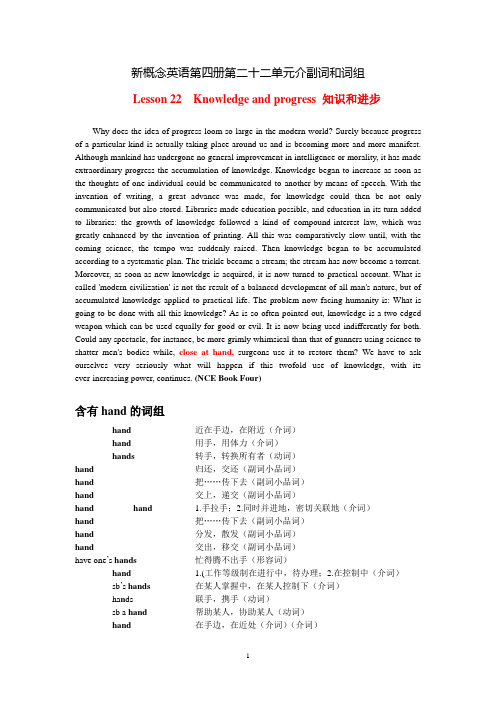
新概念英语第四册第二十二单元介副词和词组Lesson 22 Knowledge and progress 知识和进步Why does the idea of progress loom so large in the modern world? Surely because progress of a particular kind is actually taking place around us and is becoming more and more manifest. Although mankind has undergone no general improvement in intelligence or morality, it has made extraordinary progress the accumulation of knowledge. Knowledge began to increase as soon as the thoughts of one individual could be communicated to another by means of speech. With the invention of writing, a great advance was made, for knowledge could then be not only communicated but also stored. Libraries made education possible, and education in its turn added to libraries: the growth of knowledge followed a kind of compound-interest law, which was greatly enhanced by the invention of printing. All this was comparatively slow until, with the coming science, the tempo was suddenly raised. Then knowledge began to be accumulated according to a systematic plan. The trickle became a stream; the stream has now become a torrent. Moreover, as soon as new knowledge is acquired, it is now turned to practical account. What is called 'modern civilization' is not the result of a balanced development of all man's nature, but of accumulated knowledge applied to practical life. The problem now facing humanity is: What is going to be done with all this knowledge? As is so often pointed out, knowledge is a two-edged weapon which can be used equally for good or evil. It is now being used indifferently for both. Could any spectacle, for instance, be more grimly whimsical than that of gunners using science to shatter men's bodies while, close at hand,surgeons use it to restore them? We have to ask ourselves very seriously what will happen if this twofold use of knowledge, with its ever-increasing power, continues. (NCE Book Four)含有hand的词组________ hand近在手边,在附近(介词)________ hand用手,用体力(介词)________ hands转手,转换所有者(动词)hand ________ 归还,交还(副词小品词)hand ________ 把……传下去(副词小品词)hand ________ 交上,递交(副词小品词)hand ________ hand 1.手拉手;2.同时并进地,密切关联地(介词)hand ________ 把……传下去(副词小品词)hand ________ 分发,散发(副词小品词)hand ________ 交出,移交(副词小品词)have one’s hands ________ 忙得腾不出手(形容词)________ hand 1.(工作等级制在进行中,待办理;2.在控制中(介词)________ sb’s hands在某人掌握中,在某人控制下(介词)________ ha n ds 联手,携手(动词)________ sb a hand帮助某人,协助某人(动词)________ hand在手边,在近处(介词)(介词)________ (the) one hand一方面(介词)________ (the) other hand另一方面(介词)________ hand 1.无法控制;2.马上,立即(介词)take / have a hand ________ 参与,介入(介词)________ one’s hands of 对……不再负责,洗手不干,不再管(某事或某人)(动词)。
新概念英语第4册课文(中英文对照)
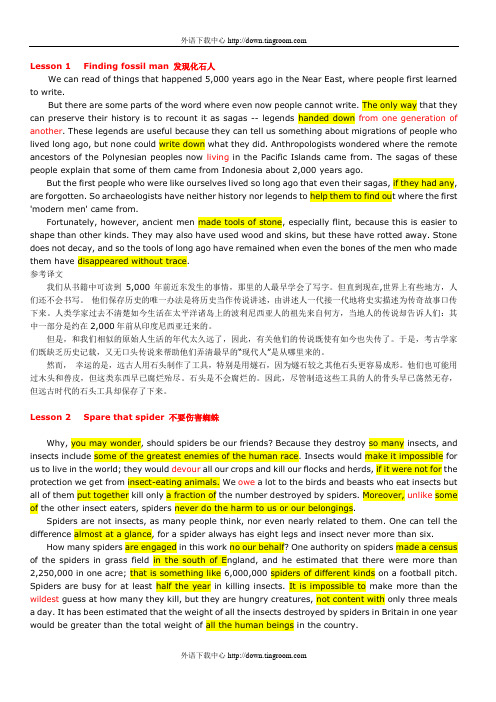
Lesson 1 Finding fossil man 发现化石人We can read of things that happened 5,000 years ago in the Near East, where people first learned to write.But there are some parts of the word where even now people cannot write. The only way that they can preserve their history is to recount it as sagas -- legends handed down from one generation of another. These legends are useful because they can tell us something about migrations of people who lived long ago, but none could write down what they did. Anthropologists wondered where the remote ancestors of the Polynesian peoples now living in the Pacific Islands came from. The sagas of these people explain that some of them came from Indonesia about 2,000 years ago.But the first people who were like ourselves lived so long ago that even their sagas, if they had any, are forgotten. So archaeologists have neither history nor legends to help them to find out where the first 'modern men' came from.Fortunately, however, ancient men made tools of stone, especially flint, because this is easier to shape than other kinds. They may also have used wood and skins, but these have rotted away. Stone does not decay, and so the tools of long ago have remained when even the bones of the men who made them have disappeared without trace.参考译文我们从书籍中可读到5,000 年前近东发生的事情,那里的人最早学会了写字。
最新新概念第四册Lesson22~24课文翻译及学习笔记
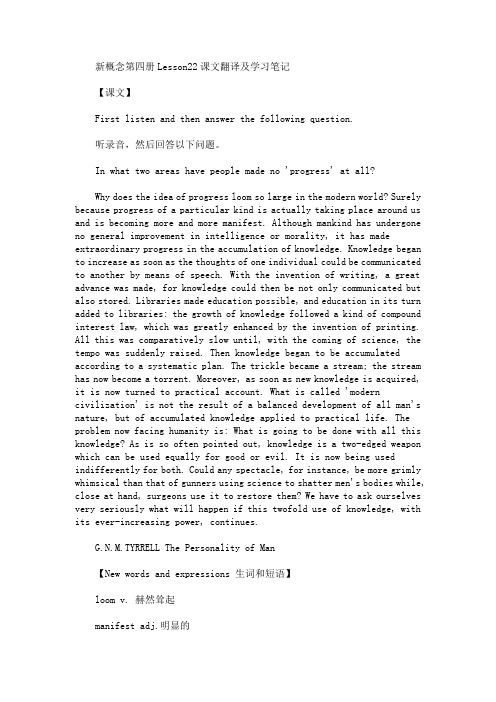
新概念第四册Lesson22课文翻译及学习笔记【课文】First listen and then answer the following question.听录音,然后回答以下问题。
In what two areas have people made no 'progress' at all?Why does the idea of progress loom so large in the modern world? Surely because progress of a particular kind is actually taking place around us and is becoming more and more manifest. Although mankind has undergone no general improvement in intelligence or morality, it has made extraordinary progress in the accumulation of knowledge. Knowledge began to increase as soon as the thoughts of one individual could be communicated to another by means of speech. With the invention of writing, a great advance was made, for knowledge could then be not only communicated but also stored. Libraries made education possible, and education in its turn added to libraries: the growth of knowledge followed a kind of compound interest law, which was greatly enhanced by the invention of printing. All this was comparatively slow until, with the coming of science, the tempo was suddenly raised. Then knowledge began to be accumulated according to a systematic plan. The trickle became a stream; the stream has now become a torrent. Moreover, as soon as new knowledge is acquired, it is now turned to practical account. What is called 'modern civilization' is not the result of a balanced development of all man's nature, but of accumulated knowledge applied to practical life. The problem now facing humanity is: What is going to be done with all this knowledge? As is so often pointed out, knowledge is a two-edged weapon which can be used equally for good or evil. It is now being used indifferently for both. Could any spectacle, for instance, be more grimly whimsical than that of gunners using science to shatter men's bodies while, close at hand, surgeons use it to restore them? We have to ask ourselves very seriously what will happen if this twofold use of knowledge, with its ever-increasing power, continues.G.N.M.TYRRELL The Personality of Man【New words and expressions 生词和短语】loom v. 赫然耸起manifest adj.明显的morality n. 道德communicate v. 交流,交际compound adj. 复合的enhance v. 增进tempo n. 速率trickle n. 涓涓细流torrent n. 滔滔洪流humanity n. 人类indifferently adv. 不在乎地grimly adv. 可怖地whimsical adj. 怪诞的shatter v. 毁坏twofold adj. 双重的【课文注释】1.loom,隐现(常令人生畏);即将发生。
新概念英语第四册惯用语整理Lesson22_24

新概念英语第四册惯用语整理Lesson22~24新概念英语第四册惯用语整理Lesson221.around prep.环绕,围着;大约,接近 adv.向四面,朝各个方向beat around the bush 转弯抹角,兜圈子例句:Don't beat around the bush. Come to the point.你不要兜圈子了。
想说什么就说什么。
(be) around 露面,被见到(appear, be seen)例句:1.I wondar wtat's happened to Jerry. He hasn't been around for at least two weeks.不知道杰瑞出了什么事。
他已经至少两星期没有露面了。
2.The head of the board will around tomorrow morning.明天上午可以见到董事长。
get around to 抽时间做…例句:1.I've been meaning to get my eyes checked. I just haven't got around to it yet. 我一直想去查查眼睛,可就是没空去。
2.I haven't got around to getting my teeth checked.我抽不出时间去检查牙齿。
around the clock 一天不间断,一天24小时不停例句:Martha studied around the clock for her management exam.玛莎为了管理考试一天学习24小时。
come around to 转变过来同意例句:Gary's beginning to come around to my point of view.加里开始同意我的观点了。
leave...around 把…乱放,乱扔例句:Sometimes I leave my books and clothes lying around and he gets angry.有时候我把书本和衣服到处乱放他就生气。
新概念第四册笔记(完美版)
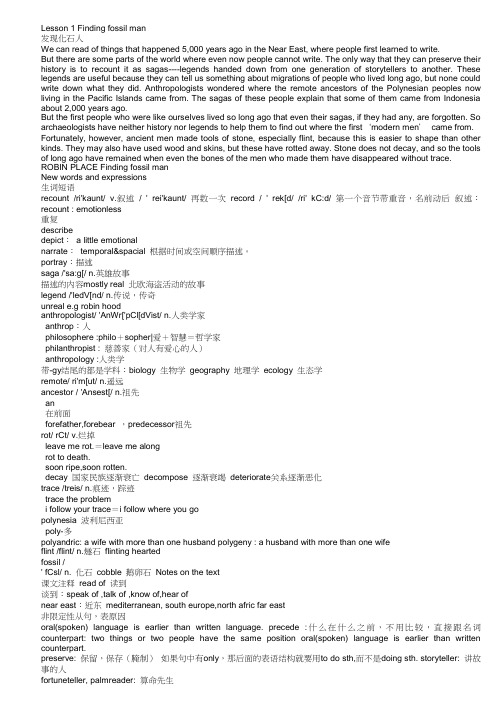
Lesson 1 Finding fossil man发现化石人We can read of things that happened 5,000 years ago in the Near East, where people first learned to write.But there are some parts of the world where even now people cannot write. The only way that they can preserve their history is to recount it as sagas----legends handed down from one generation of storytellers to another. These legends are useful because they can tell us something about migrations of people who lived long ago, but none could write down what they did. Anthropologists wondered where the remote ancestors of the Polynesian peoples now living in the Pacific Islands came from. The sagas of these people explain that some of them came from Indonesia about 2,000 years ago.But the first people who were like ourselves lived so long ago that even their sagas, if they had any, are forgotten. So archaeologists have neither history nor legends to help them to find out where the first‘modern men’came from. Fortunately, however, ancient men made tools of stone, especially flint, because this is easier to shape than other kinds. They may also have used wood and skins, but these have rotted away. Stone does not decay, and so the tools of long ago have remained when even the bones of the men who made them have disappeared without trace. ROBIN PLACE Finding fossil manNew words and expressions生词短语recount /ri'kaunt/ v.叙述/ ' rei'kaunt/ 再数一次record / ' rek[d/ /ri' kC:d/ 第一个音节带重音,名前动后叙述:recount : emotionless重复describedepict:a little emotionalnarrate:temporal&spacial 根据时间或空间顺序描述。
- 1、下载文档前请自行甄别文档内容的完整性,平台不提供额外的编辑、内容补充、找答案等附加服务。
- 2、"仅部分预览"的文档,不可在线预览部分如存在完整性等问题,可反馈申请退款(可完整预览的文档不适用该条件!)。
- 3、如文档侵犯您的权益,请联系客服反馈,我们会尽快为您处理(人工客服工作时间:9:00-18:30)。
新概念第四册课文翻译及学习笔记:Lesson22 【课文】First listen and then answer the following question.听录音,然后回答以下问题。
In what two areas have people made no 'progress' at all?Why does the idea of progress loom so large in the modern world? Surely because progress of a particular kind isactually taking place around us and is becoming more andmore manifest. Although mankind has undergone no general improvement in intelligence or morality, it has madeextraordinary progress in the accumulation of knowledge.Knowledge began to increase as soon as the thoughts of one individual could be communicated to another by means ofspeech. With the invention of writing, a great advance wasmade, for knowledge could then be not only communicated butalso stored. Libraries made education possible, and educationin its turn added to libraries:the growth of knowledge followed a kind of compound interest law, which was greatly enhanced by the invention of printing. All this wascomparatively slow until, with the coming of science, thetempo was suddenly raised. Then knowledge began to be accumulated according to a systematic plan. The tricklebecame a stream; the stream has now become a torrent.Moreover, as soon as new knowledge is acquired, it is nowturned to practical account. What is called 'moderncivilization' is not the result of a balanced development ofall man's nature, but of accumulated knowledge applied topractical life. The problem now facing humanity is:What isgoing to be done with all this knowledge? As is so often pointed out, knowledge is a two-edged weapon which can be used equally for good or evil. It is now being used indifferently for both. Could any spectacle, for instance, be more grimly whimsical than that of gunners using science to shatter men's bodies while, close at hand, surgeons use it to restore them? We have to ask ourselves very seriously what will happen if this twofold use of knowledge, with its ever-increasing power, continues.G.N.M.TYRRELL The Personality of Man【New words and expressions生词和短语】loom v.赫然耸起manifest adj.明显的morality n.道德communicate v.交流,交际compound adj.复合的enhance v.增进tempo n.速率trickle n.涓涓细流torrent n.滔滔洪流humanity n.人类indifferently adv.不在乎地grimly adv.可怖地whimsical adj.怪诞的shatter v.毁坏twofold adj.双重的【课文注释】1.loom ,隐现 ( 常令人生畏 ); 即将发生。
①I f something looms over you, it appears as a largeor unclear shape, often in a frightening way.例句: The mountainous island loomed on the horizon.那座巨大的岛屿隐隐约约浮现在地平线上。
②I f a worrying or threatening situation or event islooming, it seems likely to happen soon.例句: The looming threat of recession made them anxious.近在眼前的经济衰退让他们很是焦虑。
2.take place,发生。
take place和happen意思相近,都有发生的意思,但take place 更强调有人为因素参与的某事发生、有计划的使某事发生,而happen 多指没有计划的、自然发生的。
来看几个例子就知道了 ^^例句: The fete will take place on Sunday, rain or shine.游园义卖会定於星期日举行,风雨无阻。
这句话用 happen 就不妥,因为 fete 是不会无计划、自不过然自己发生的。
例句: The accident happened at the corner of the street.意外发生在街角。
这句话中因为 accident 不是人为安排的让其发生的,所以用happen 更好。
3.undergo ,经历,遭受。
If you undergo something necessary or unpleasant, ithappens to you.例句: During the past few decades, this cityhas undergone great changes.过去的几十年中,这座城市经历了巨大的变化。
undergo changes 是个比较正式地道的表达。
4.with the invention of wrinting,短语中的with是“因为”的意思。
cation in its turn added to libraries,教育反过来也丰富了藏书。
①in turn,反过来,转而。
例句: One of the members of the surgical team leakedthe story to a fellow physician who, in turn, confided in areporter.医疗队中的一名成员把故事告诉了一名内科医生,该内科医生转而又告诉了记者。
②i n turn ,轮流。
例句: The girls called out their names in turn.那些女孩儿逐一报出自己的名字。
6.a kind of compound interest law,一种复利法则。
compound interest law有时也被称作“雪球法则”,即利上滚利,增长很快。
7.turn...to account,利用。
例句: We should turn knowledge to good account to builda better future.我们应该好好利用知识,创造一个美好的未来。
8.Could any spectacle,...to restore them?这句话从形式上是个疑问句,但实质上起一个增强语气的陈述句的作用,这种疑问句常被称为修辞疑问句。
9.this twofold use of knowledge,知识的这种双重性。
twofold 表示双重性: You can use twofold to introduce atopic that has two equally important parts.例句: The case against is twofold:too risky and too expensive.反对的理由有两个:太冒险,太昂贵。
【参考译文】为什么进步这个概念在现代世界显得如此突出 ?无疑是因为有一种特殊的进步实际上正在我们周围发生,而且变得越来越明显。
虽然人类有智力和道德上没有得到普遍提升,但在知识积累方面却取得了巨大的进步。
人一旦能用语言同别人交流思想,知识的积累便开始了。
随着书写的发明,又迈进了一大步,因为这样一来,知识不但能交流,而且能储存了。
藏书使教育成为可能,而教育反过来又丰富了藏书,因为知识的增长遵循着一种“滚雪球”的规律。
印刷术的发明又大大提升了知识增长的速度。
所有这些发展都比较缓慢,而随着科学的到来,增长的速度才突然加快。
于是,知识便开始有系统有计划地积累起来。
涓涓细流汇成小溪,小溪现已变成了奔腾的江河。
而且,新知识一旦获得,便得到实际应用。
所谓“现代文明”并不是人的天性平衡发展的结果,而是积累起来的知识应用到实际生活中的结果。
现在人类面临的问题是:用这些知识去做什么 ?正像人们常常指出的,知识是一把双刃刀,能够用于造福,也能够用来为害。
